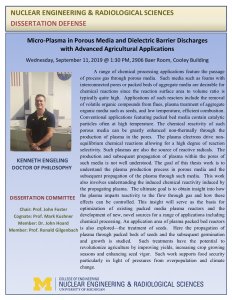Presented By: Nuclear Engineering & Radiological Sciences
PhD Defense: Kenneth Engeling
Micro-Plasma in Porous Media and Dielectric Barrier Discharges with Advanced Agricultural Applications

Title: Micro-Plasma in Porous Media and Dielectric Barrier Discharges with Advanced Agricultural Applications
Chair: Prof. John Foster
Abstract: A range of chemical processing applications feature the passage of process gas through porous media. Such media such as foams with interconnected pores or packed beds of aggregate media are desirable for chemical reactions since the reaction surface area to volume ratio is typically quite high. Applications of such reactors include the removal of volatile organic compounds from flues, plasma treatment of aggregate organic media such as seeds, and low temperature, efficient combustion. Conventional applications featuring packed bed media contain catalytic particles often at high temperature. The chemical reactivity of such porous media can be greatly enhanced non-thermally through the production of plasma in the pores. The plasma electrons drive non- equilibrium chemical reactions allowing for a high degree of reaction selectivity. Such plasmas are also the source of reactive radicals. The production and subsequent propagation of plasma within the pores of such media is not well understood. The goal of this thesis work is to understand the plasma production process in porous media and the subsequent propagation of the plasma through such media. This work also involves understanding the induced chemical reactivity induced by the propagating plasma. The ultimate goal is to obtain insight into how the plasma imparts reactivity to the flow through gas and how these effects can be controlled. This insight will serve as the basis for optimization of existing packed media plasma reactors and the development of new, novel sources for a range of applications including chemical processing. An application area of plasma packed bed reactors is also explored—the treatment of seeds. Here the propagation of plasma through packed beds of seeds and the subsequent germination and growth is studied. Such treatments have the potential to revolutionize agriculture by improving yields, increasing crop growing seasons and enhancing seed vigor. Such work supports food security particularly in light of pressures from overpopulation and climate change.
Chair: Prof. John Foster
Abstract: A range of chemical processing applications feature the passage of process gas through porous media. Such media such as foams with interconnected pores or packed beds of aggregate media are desirable for chemical reactions since the reaction surface area to volume ratio is typically quite high. Applications of such reactors include the removal of volatile organic compounds from flues, plasma treatment of aggregate organic media such as seeds, and low temperature, efficient combustion. Conventional applications featuring packed bed media contain catalytic particles often at high temperature. The chemical reactivity of such porous media can be greatly enhanced non-thermally through the production of plasma in the pores. The plasma electrons drive non- equilibrium chemical reactions allowing for a high degree of reaction selectivity. Such plasmas are also the source of reactive radicals. The production and subsequent propagation of plasma within the pores of such media is not well understood. The goal of this thesis work is to understand the plasma production process in porous media and the subsequent propagation of the plasma through such media. This work also involves understanding the induced chemical reactivity induced by the propagating plasma. The ultimate goal is to obtain insight into how the plasma imparts reactivity to the flow through gas and how these effects can be controlled. This insight will serve as the basis for optimization of existing packed media plasma reactors and the development of new, novel sources for a range of applications including chemical processing. An application area of plasma packed bed reactors is also explored—the treatment of seeds. Here the propagation of plasma through packed beds of seeds and the subsequent germination and growth is studied. Such treatments have the potential to revolutionize agriculture by improving yields, increasing crop growing seasons and enhancing seed vigor. Such work supports food security particularly in light of pressures from overpopulation and climate change.